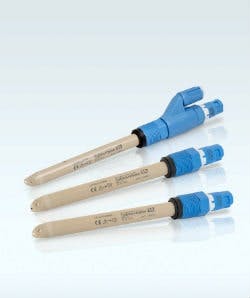Endress+Hauser launched Memosens CPS47D, CPS77D and CPS97D ISFET pH sensors for applications where glass pH sensors present risk of breakage in challenging process conditions. ISFET sensors are made of unbreakable PEEK and are available with three different reference systems, providing a glass-free pH sensor to suit every requirement.
ISFET Memosens CPS47D and CPS77D sensors are equipped to meet the strict demands of hygienic applications. Because of their new design, with an increased chip surface, these sensors are easy to clean. They deliver stable and reproducible measured values, even after sterilization and autoclaving up to temperatures of 275 °F (135 °C); come with the usual hygienic approvals for the food and life sciences industries, such as USP, EHEDG and 3A; and are TSE/BSE-free. They can last at least 25 CIP cycles - a significant improvement in CIP stability compared to conventional ISFET sensors. In addition, the Memosens CPS77D offers maximum bacteria tightness because of its microporous ceramic diaphragm.
Chemical processes at low temperatures, and where there is a high proportion of organic solvents or solids, pose specific challenges for pH measurement. Even at low temperatures, the Memosens CPS97D has a fast response time and is chemically stable thanks to its PEEK stem. Also, its open diaphragm does not become clogged in the case of high solids concentrations. The firm gel used in the reference is also extremely resistant to chemicals.
Digital ISFET sensors with Memosens technology store calibration, sensor and process data. A significant increase in process safety can be achieved through combining the Liquiline platform with efficient sensor management using Memosens Plus software.Using Memobase Plus software, the sensors can be cleaned and calibrated under optimum conditions in a lab. This not only increases the operating life of the sensors, but also makes commissioning and maintenance considerably easier, while reducing process downtime to a minimum. The stored data can also be used for predictive maintenance and process optimization.

